Town’s desperate cry for help: Six months since floods, families still living in sheds and caravans
Six months after floods devastated Rochester, more than half the town’s residents are still living in caravans and sheds, unsure if and when they can move back into their homes.
Victoria
Don't miss out on the headlines from Victoria. Followed categories will be added to My News.
More than half the residents of Rochester are still living in caravans and sheds, six months after the town was inundated by devastating floods.
With winter looming, flood recovery efforts have become bogged down in insurance disputes and bureaucracy.
Hundreds of locals, including young families and the elderly, remain in the dark about when, or even if, they can move back into their homes.
Rochester Community Recovery chairman Leigh Wilson told the Sunday Herald Sun “north of 50 per cent” of Rochester residents were yet to move back into their homes.
He said most houses were “completely gutted” of sodden carpets and walls in the aftermath of the floods, only for work to suddenly stop.
“It doesn’t matter whether you’re rich or you’re poor, whether you’re a large family or you’re on your own, this didn’t discriminate,” he said.
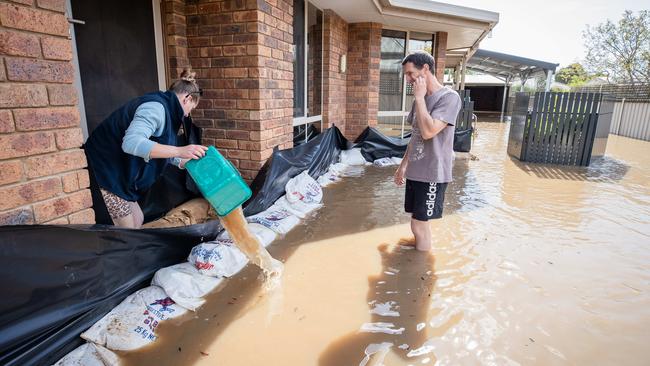
Mr Wilson said mental health was one of the biggest concerns for the community, with many still reeling from the trauma of the floods.
Speaking to locals across Rochester, almost everyone told the Sunday Herald Sun of someone they knew who was doing it tough and could use more support.
“There are some agencies doing work on the ground. but we feel at the local level that we still don’t have enough resources here to assist people when they need that help when they’re having a bad moment,” Mr Wilson said.
“(The issue is) Managing living in that environment where you’re trying to balance everything. You’ve got kids doing homework, sitting around a small table in the caravan. Everything’s just that bit harder.”
Some residents are involved in drawn-out disputes with insurance companies, while a shortage of tradies has left others unable to return home even after their claims settle.
Rachael Windridge, her husband Corey, and their daughters Lily, 3, and Letti, 1, are living in a shed at the back of their property with no toilet or shower. When it rains it is almost impossible to keep out the mud.
Ms Windridge said she had no idea when she could move back into their house.
“A lot of people from outside of town come through and they think it’s all fine … no, we’re not. We’re not even home yet.
“We thought we’d be back in by winter … I didn’t expect to still be waiting for things to be pulled out.
“I thought we’d at least have started (construction) by now. I just want to go home.”
Becky O’Sullivan said the hardest thing about living in a caravan was missing the little things like a kitchen sink or running water.
Her family of five had to scramble to sandbag their home as the water rose, but it was not enough to stop the damage.
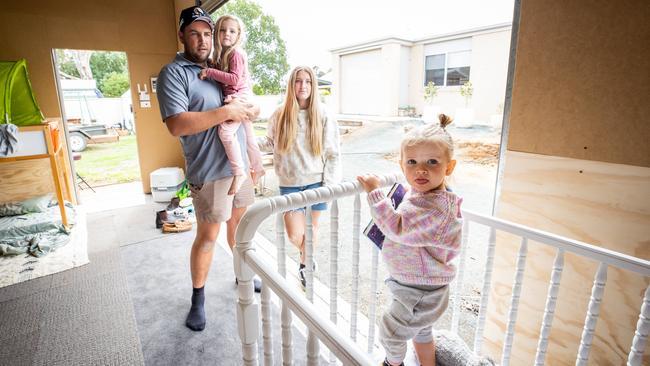
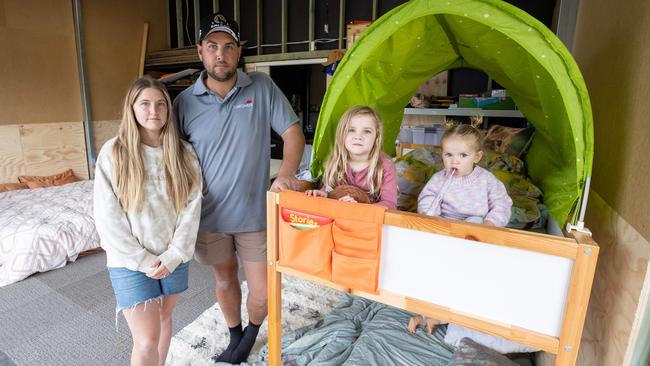
They now live in a caravan they were keeping safe at a friend’s house, and Ms O’Sullivan said the lack of space was a big challenge.
“The kids don’t get personal space or room of their own,” she said.
“We are constantly on top of each other.
“The last six months have been some of the longest days and weeks, and have tested us like nothing else.
“We may look OK as you drive through the main street, but we are not OK.
“Drive down the side streets and see the caravans and shipping containers, look through the windows of houses and see the empty space that was a home, stop and talk to the locals and hear their stories.
“There are so many struggling and there aren’t doors to hide behind anymore.”
Campaspe Shire Mayor Rob Amos said Rochester, as well as other towns hit by floods, urgently needed support from federal and state governments.
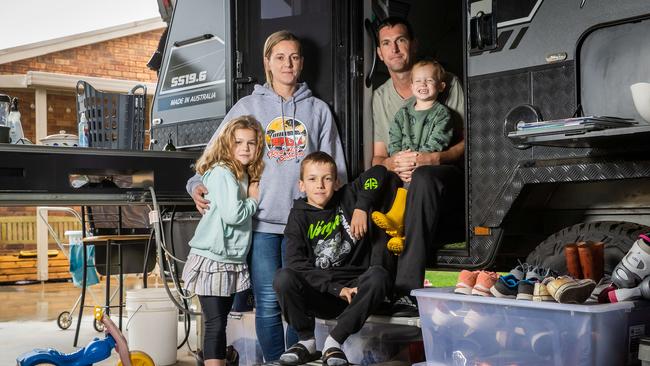
“The longer recovery takes, the tougher it will be for these communities,” he said.
The state government gave the council a $1.5m grant in the aftermath of the floods, as well as $2.2m to fix roads, and funding for housing and mental health support.
“Six months on from this devastating event, we’re continuing to back communities to recover – because we know this takes time,” a state government spokeswoman said.
Victorian Farmers Federation president Emma Germano said regional Victoria had bounced from disaster to disaster.
“We have communities in absolute dismay at the lack of assistance for repair and recovery,” she said.
“We have farmers funding their own levee banks, rural councillors begging for road funding, small business owners still trying to reopen impacted businesses, and mental health issues at a critical point, and the best the government can come up with is an inquiry.
“Most importantly, those who have been impacted feel as though the government and the media have already moved on.”
Nationals leader and local MP Peter Walsh said: “There’s almost a bit of despair, and from the community leaders a genuine concern that people may not come back … because things are just taking so long”.
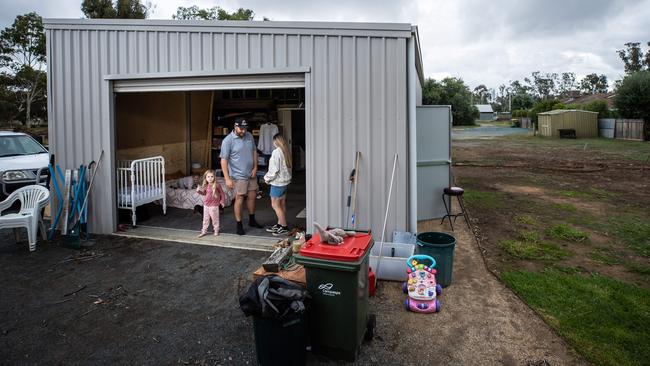
He said they had requested money for additional flood recovery roles, which had not yet been provided, and that they were still waiting for money under the Disaster Recovery Funding Arrangement (DRFA).
This fund works as an insurance scheme where governments reimburse councils for expenses and is cost-shared between both levels of government.
“Council has received some funding for flood recovery activities to date; however, we are still waiting on substantial funding across a range of operational areas,” Councillor Amos said.
“Council is also yet to be funded for a recovery hub.
“We urgently call on the two tiers of government to act swiftly in providing this much-needed funding for our flood-impacted communities. With dozens of residents still not living in their own home, many people struggling with mental health issues and whole communities trying to restore their social fabric and local economies, the money can’t come quick enough.
The recovery committee’s Mr Wilson said rebuilding efforts at the town’s three schools provided a glimmer of hope.
Ms O’Sullivan said: “If it wasn’t for our local community and local businesses we would have been stuffed. The community spirit in Rochester is amazing.”
More Coverage
Originally published as Town’s desperate cry for help: Six months since floods, families still living in sheds and caravans




